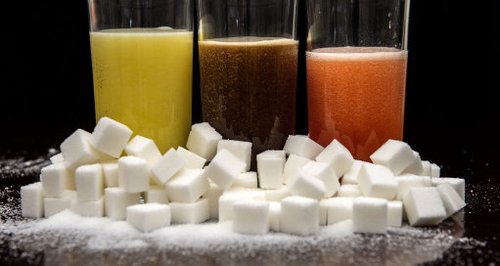Children Drink "600,000 Sugary Drinks" a Day
4 December 2018, 08:45

Children across Scotland consume almost 4.4 million soft drinks a week - the equivalent of more than 600,000 a day - new research has estimated.
The figures, produced by Cancer Research UK, prompted demands for Scottish ministers to change the law to crack down on supermarket
multi-buy offers on sugary drinks, many of which are sold as part of bulk buy deals.
Professor Linda Bauld, Cancer Research UK's prevent expert, said this would help by "deterring families from stocking up on drinks that are
doing so much damage to our diets".
Health campaigners there had used data from the 2015-2017 Scottish Health Survey to calculate the number of soft drinks - including fizzy
drinks, energy drinks and diluting juice with added sugar - that youngsters were consuming.
By applying the frequency at which these were consumed to the number of children aged between two and 15, they estimated youngsters
across the country drank 627,288 of these a day - amounting to 4,391,015 a week.
The figures did not include diet drinks, low calorie or no added sugar drinks, or fresh fruit juices.
Official NHS figures for the school year 2016-17 found almost a quarter (22.9%) of pupils in P1 were at at risk of being either overweight or
obese.
While the UK Government has introduced a so-called "sugar tax" on soft drinks, Prof Bauld insisted more could be done.
She said: "It's scandalous that sugary drinks are now a routine part of what our children are consuming daily.
"Supermarket multi-buy deals encourage us to bulk buy, so these drinks are always within reach at home.
"And with almost a quarter of children as young as four entering primary school overweight or obese, the dreadful consequences of our diets are all too obvious.
"While the Sugar Tax was a step in the right direction, there's much more to be done.
"The Scottish Government must take action by introducing laws to restrict the multi-buy offers on junk food and sugary drinks. This measure would go a long way to deterring families from stocking up on drinks that are doing so much damage to our diets."
Her call was backed by grandmother Gail Nesbit, from Easter Drylaw, Edinburgh, whose seven year old granddaughter Maci attends the Fet-
Lor Youth Club, in the north of the city.
It has recently banned junk food and high sugar drinks from its tuck shop as part of health eating initiatives.
Ms Nisbet, 58, said: "The amount of sugary drinks children routinely drink is shocking. So many of the kids go to the supermarket to buy
their lunch and of course they're looking to get the most for their money.
"If the offers weren't on sugary juices, then the kids would go for something else instead.
"The special offers are the first thing that hit you when you walk into the supermarket and it's natural to want to pick up a bargain and stock up.
"Most of the time these offers are on things that are bad for you and make you put on weight.
"If these drinks weren't on offer, people would think twice before buying them."
Fet-Lor youth work manager Amy Henderson told how the club had been "working really hard to make sure the young people who come
here have access to healthy food and drink".
But she added: "If a young person goes to the local shop at lunchtime with £3 in their pocket and they see they can get big bottles of sugar-
packed fizzy juice in a deal, well they're going to be tempted to go for that, thinking they're getting more for their money.
"Multi-buy offers on junk food and sugary drinks are really unhelpful and, by their very nature, they're tempting us all to buy them.
"It's shocking that so many children in Scotland are an unhealthy weight and it's clear to us that much more could be done by the Scottish
Government to help us all to manage this better."
A Scottish Government spokesman said: "Giving children the best possible start in life is one of this Government's key priorities. That is why
our ambition to halve childhood obesity by 2030 is at the heart of our diet and healthy weight delivery plan.
"We are currently consulting on measures to tackle our nation's damaging relationship with junk food, such as sugary drinks. This includes
restricting multi-buys that encourage their overconsumption.
"The delivery plan also includes actions to tackle childhood obesity, which will start pre-pregnancy and continue throughout school years and into adolescence. This includes more support for children, young people and families to achieve a healthy weight, and training for frontline
staff in services that work with them."







